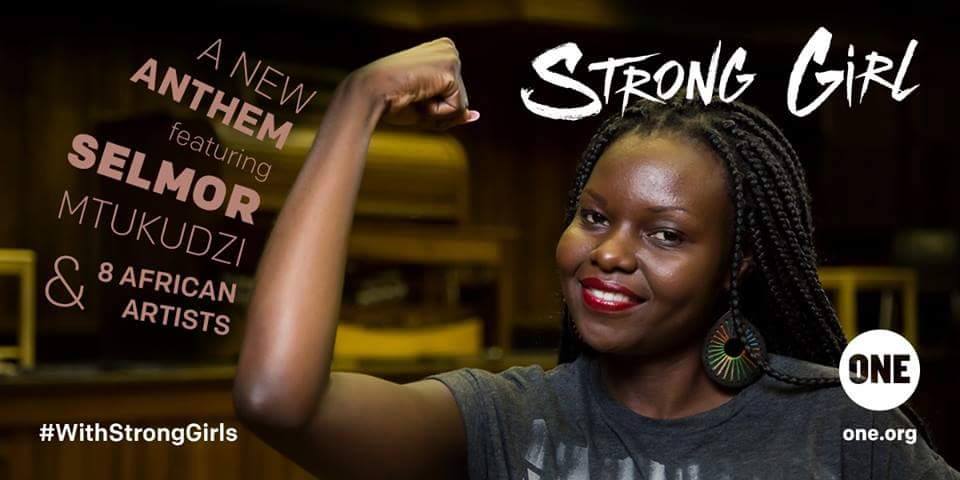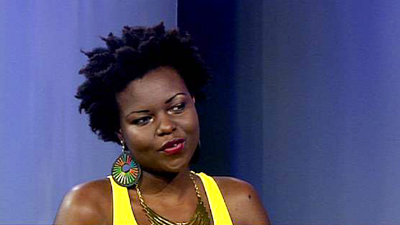Selmor Mtukudzi is an activist and a musician, and at least for this week, she's also a tourist on her first visit to the United States. When Afropop's Ben Richmond called her up, Mtukudzi had just gotten done seeing the White House, which she praised as beautiful—despite its age—in her effusive and friendly manner, even though she was bummed that you aren't allowed to take pictures in the Oval Office. “I'm not going to be able to prove to anyone that I was actually there,” she joked.
But Mtukudzi is doing more during her two-week visit to the U.S. than just sightseeing. She is here to speak to the media, nonprofit organizations and politicians on Capitol Hill, and encourage them to get involved with the One Campaign, which just facilitated a pan-continental collaboration of musicians from across Africa (and, uh, Bono) to produce the song “Strong Girl Remix.”
WATCH: "Strong Girl Remix" video on Afropop Worldwide
She was kind enough to take some time to chat on the phone from Washington D.C., and describe how the song came together, how poverty is sexist, and how bringing electricity to Africa would save lives.
Ben Richmond: Why we don't get started start by telling me about the One Campaign and how you became involved in it?
Selmor Mtukudzi: The One Campaign is a campaign-based organization. So the first campaign was called “Poverty Is Sexist,” where we were talking about the empowerment of women and girls in order to end poverty by the year 2050. We came together, singers and activists from all over Africa, and we recorded songs to help promote the actual campaign.
You're in the song, I see. Can you tell me about it?
Yes, I am. It was quite an experience, getting together with all the other different artists from different countries and getting to know different cultures and the similarities that we have and finding out that the issues that we have in my country are the same all across Africa.
All the collaborators were able to all get together and meet face to face?
We did! All of us came from different countries and we met in South Africa and we did the song and the video there. So, we worked and became friends, even.
Could you describe the theme of the song and what it means? What do you want to communicate?
The song was mainly encouragement for all the women out there, to say that we as women can do it, we can do whatever we put our minds to and we can achieve things in life, we shouldn't let anybody talk us down, and trying to put the message out there to our governments to start putting in policies that also empower women who are very much disadvantaged. As women, especially in Africa we have so many responsibilities at home, with the children, and even with the husbands; we take care of all of that. If the woman is empowered, then all of these people benefit. So that's the message we're trying to put across to everybody.
That speaks to your experience in Zimbabwe?
Not only Zimbabwe, all of the countries that were involved and sent activists to do the song, and now I'm very confident to say that even the other countries that weren't involved face these same issues. Women are not given equal opportunities, either in business or in anything that they want to do. For instance, in the music industry, it is male dominated. And for a woman to be able to become what she has potential to achieve is a huge deal, and it doesn't happen very often. And so getting together as women to speak up about it, and say that we are as good and as capable—not that we are better, but that we're just able, and should be able to be given a chance to reach our full potential.
One Campaign is more than this song. What else do they do? Where do you hope this song goes?
Actually with the Poverty Is Sexist campaign we managed to get people to sign the petition that we had, over a million people signed the petition and we were able to hand it over to our governments, and the African Union in July, and at the economic forum, we were able to take it to the world leaders and have them put policies in place that ultimately benefit women and children. So now what we are focusing on is energy poverty, and trying to get the Electrify Africa bill passed here in America to become a law.
Selmor on South African television
How long are you in the U.S.? What will you be doing while you're visiting?
Actually I have been here for a week now, I started out in New York and I was nominated for an award, an African Achievement award, which I won. I was very surprised by it, but now we're moving on to Cincinnati for a small performance there. It will be a total of about two weeks.
Are you traveling with a band of the other musicians from the collaboration
No, it's just me and my husband who played the guitar on the song. So it's just the two of us.
Can you tell me more about the bill you're promoting?
The Electrify Africa bill tries to encourage people to go to One.org, sign the petition there because the electrification of Africa would definitely save lives. What's been going on is that we haven't had electricity for the longest time and lack of electricity is affecting mainly and mostly women and children, because, being a mother myself, I have to prepare my kids for school every morning. And when there's no energy I have to go out and look for firewood. I have to come back and light the fire up, sometimes it's raining and you can't do it inside, and it's not safe for the kids in the home, all the smoke inhalation, and it's a terrible thing to be going through. So we're asking people here to go to One.org and sign the petition. Once you do that, please call your senator, call your congressman and ask them to support this Electrify Africa bill. It will definitely save lives in Africa.
It certainly sounds like a good example of the sexism of poverty.
Woman have more responsibilities in the home, so everything to do with the lack of electricity is putting the burden on top of what you're already taking care of makes lives very difficult.
Any other new music we can look forward to?
I just had a single that came out, people can look it up on YouTube, it's called "Zvidikidiki," but if you just type in my name you'll find it.











